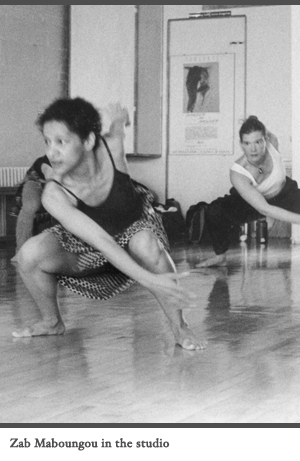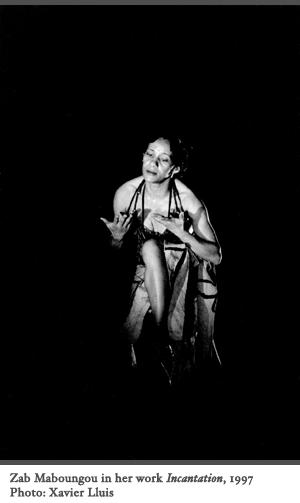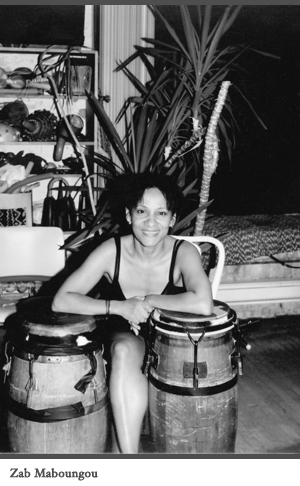| 
previous page  ZM: All of this was a struggle. It had a lot to do with the ideological aspect of what people thought African dance was. ZM: All of this was a struggle. It had a lot to do with the ideological aspect of what people thought African dance was.
I had no choice but to do solo dances in order to counteract this effect, in order to show something besides a lot of African people on stage with a lot of energy and drums. And when I went back to Congo, and danced solo, the people there saw this as a statement. And actually, people paid attention to the solo performances everywhere and on all continents. Little by little dancers paid attention, and said, “Okay, I'm interested to learn this. I see what she's doing. Can I take your training?” and so on. It was a chance to open up a new way of looking at African dance and therefore dance in general. It took a bunch of aficionados, people who followed, who took my classes. I trained some people from the beginning, and they came to really understand the challenge. This is how Zab Maboungou/Compagnie Danse Nyata Nyata came about.CA: Can you speak about your relationship with musicians? ZM: The drummers! Musicians, you know, operate in another realm. You have to look at the difficulty of inserting oneself into the world of art and culture, especially when you are being put in the container of “world music”. I know a lot of musicians, I'm sort of a mentor – I give a lot of advice on how to operate as musicians and artists, knowing, of course, some of the issues, musically speaking but also in terms of the musical world. So yes, I work a lot with musicians. Drummers occupy a special territory. In the traditions of Africa, they're almost like a medium – they're at the heart of the circle of the dance, of the music, of communicating with the spirits. The drum holds that. Often though, these drummers suffer from being alienated socially by a mentality that considers drumming as a tradition from the past that has no value in this modern world. When they arrive here they see that everyone knows the drum but nobody understands anything of it. In African tradition, the drum is not just the foundation, it is the music and it is the life. That says a lot about the complexity of choreographing with a contemporary frame of mind. I came from Central Africa. Djembes (which are widely known here) are from West Africa – their high sound is what most people know, here in Canada and in the USA. Congo drum sound is deeper – Haitian rhythms are more like this. So of course I chose Haitian musicians before West Africans. That in itself is interesting – as an immigrant coming from Africa, I was not necessarily going to work with Africans; I worked with Caribbean people, who have retained certain rhythms more, and are more connected to those than African people of today. This is very important because it tells a story of the travelling of the rhythms, of the cultures. And this is the type of story that I've really tried to honour, I would say, in the way I made contact, in the way I organize the art, in the way I approach creation, in the way I work on encounters. This is what we do with our international dance and drum workshop every year in July. We bring here many traditions that have evolved and are interconnected. Our workshop presents dance forms, as well as their techniques, that move from the traditional to the contemporary.  CA: Can you speak about tradition's place in your creative process? CA: Can you speak about tradition's place in your creative process?
ZM: I like digging more than spreading. For some reason, that, for me, resonates much more in terms of creation, to dig rather than spreading yourself all over the place. It's funny from someone who has been all over – I mean, I've lived on three continents. I keep on moving. But it's always, for me, about digging. So you dig – and then, things come up.The understanding of what rhythms are is long coming. I've been to enough conferences, all over the world, to know that not many people talk about what I'm talking about – I'm probably one of the only ones. I was in Africa as an artistic counselor for the MASA - an African market for the live arts. I was designated as an artistic counselor by the Minister of Culture of Ivory Coast to guide them in artistic choices regarding dance, choreography and so on. I organized the first pan-African choreographic workshop in Africa, back in the 1990s. When I came to perform with the drum, the African choreographers were already using DJ's, synthesizers – that was the fashion. As a contemporary choreographer, for me the drum has remained a strong symbol and a powerful tool. But whatever you do make sure that the symbol somehow carries something that is not just decoration. So it's been a challenge, it's still a challenge, but I can see that people now pay attention to rhythms differently. I've been trained to the drum. Anything I do, even in silence, emanates from that. To be trained by the drum doesn't mean to do technique “with a lot of energy”: it's an art of dialoguing, it's an art of conversing with time. It's an art of being able to see the precise time that's your life. CA: Can you comment on changes you have perceived and experienced?ZM: There's a shift, but it's painful – it's hard. I'm in Quebec – it's still very tough – any time you don't pay attention, you start again. Now, I see my relaises (successors), people I've trained, not only the second generation but the generation after that. Now the ones I trained are seeing their second generation. Quebec has its own struggle with Canada, with the world – but with Canada, mainly. We're at this point where people have admitted that there are things to discuss. Not to intellectualize art so much that we're unable to reach out and converse with people. I've been working on myself in ways that are artistic and academic, while engaging with the various communities. I had to do all of that because it's me, because it reflects my life. So much had to be done – so much still has to be done: it took twenty years to expect to have more than half black students in my classes – before that, it was all white. To me, cultural diversity means to have black people in my class! They're the ones who don't come – there's this attitude – “She's African, what is she going to teach us? I'm from Haiti, I'm from Martinique, I'm from Barbados …” That was also the work, to reconnect with Caribbean people but also the African American, in order to show the links, and to discuss this movement in the world that one can call diaspora. And to celebrate – because dance celebrates. It indicates that your body is joyful enough to move. Joy is not happiness, it's a spiritual state. Excerpt from Maboungou's DécompteIt's who you are. That is true rhythm: the very simple and very modest art of being in and into world. That is magic. That's really what I want and hope to attain with people, with dancers. 
| |


 ZM: All of this was a struggle. It had a lot to do with the ideological aspect of what people thought African dance was.
ZM: All of this was a struggle. It had a lot to do with the ideological aspect of what people thought African dance was. 
